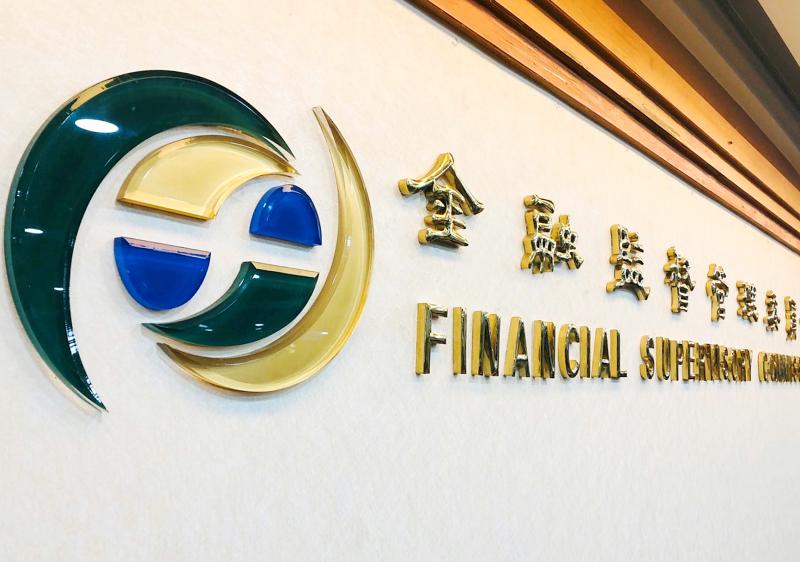Banks should notify their clients of any online transaction of more than NT$3,000 (US$108.50) via text message, smartphone app or e-mail, the Financial Supervisory Commission (FSC) said yesterday, as it lowered the limit from NT$5,000 to prevent credit card fraud amid increasing reports of cases involving smaller amounts.
The Bankers’ Association of the Republic of China (銀行公會) and credit card issuers reached a consensus on lowering the threshold in a meeting held by the commission on Jan. 4, the FSC said yesterday, adding that banks would have six month to update their systems.
“We noticed that the average amount in card frauds has declined in the past few years, from NT$4,030 in 2018 to NT$3,269 in the first 10 months of last year. It seems that thieves are targeting smaller charges,” Banking Bureau Chief Secretary Phil Tong (童政彰) said.

Photo: Kelson Wang, Taipei Times
The commission suggested to lower the limit to help cardholders check their balances more thoroughly, Tong said.
“Among all types of credit card fraud, online transaction frauds using stolen credit cards or card details had a share of 99 percent,” Tong said.
Last year’s figure compares with 97.2 percent in 2017, 97.7 percent in 2018, 97.08 percent in 2019 and 98.31 percent in 2020, Tong said, adding that preventing credit card fraud on the Internet is becoming increasingly important.
Some banks allow cardholders to set a lower notification threshold for online purchases, Tong added.
In the first 10 months of last year, Taiwan reported 495,000 credit card fraud cases, resulting in combined losses of NT$1.62 billion, FSC data showed.
However, the proportion of credit card fraud accounted for less than 0.1 percent of all 1.58 billion credit card transactions during the same period, the data showed.

US sports leagues rushed to get in on the multi-billion US dollar bonanza of legalized betting, but the arrest of an National Basketball Association (NBA) coach and player in two sprawling US federal investigations show the potential cost of partnering with the gambling industry. Portland Trail Blazers coach Chauncey Billups, a former Detroit Pistons star and an NBA Hall of Famer, was arrested for his alleged role in rigged illegal poker games that prosecutors say were tied to Mafia crime families. Miami Heat guard Terry Rozier was charged with manipulating his play for the benefit of bettors and former NBA player and

The DBS Foundation yesterday announced the launch of two flagship programs, “Silver Motion” and “Happier Caregiver, Healthier Seniors,” in partnership with CCILU Ltd, Hondao Senior Citizens’ Welfare Foundation and the Garden of Hope Foundation to help Taiwan face the challenges of a rapidly aging population. The foundation said it would invest S$4.91 million (US$3.8 million) over three years to foster inclusion and resilience in an aging society. “Aging may bring challenges, but it also brings opportunities. With many Asian markets rapidly becoming super-aged, the DBS Foundation is working with a regional ecosystem of like-minded partners across the private, public and people sectors

BREAKTHROUGH TECH: Powertech expects its fan-out PLP system to become mainstream, saying it can offer three-times greater production throughput Chip packaging service provider Powertech Technology Inc (力成科技) plans to more than double its capital expenditures next year to more than NT$40 billion (US$1.31 billion) as demand for its new panel-level packaging (PLP) technology, primarily used in chips for artificial intelligence (AI) applications, has greatly exceeded what it can supply. A significant portion of the budget, about US$1 billion, would be earmarked for fan-out PLP technology, Powertech told investors yesterday. Its heavy investment in fan-out PLP technology over the past 10 years is expected to bear fruit in 2027 after the technology enters volume production, it said, adding that the tech would

YEAR-END BOOST: The holiday shopping season in the US and Europe, combined with rising demand for AI applications, is expected to drive exports to a new high, the NDC said Taiwan’s business climate monitor improved last month, transitioning from steady growth for the first time in five months, as robust global demand for artificial intelligence (AI) products and new iPhone shipments boosted exports and corporate sales, the National Development Council (NDC) said yesterday. The council uses a five-color system to measure the nation’s economic state, with “green” indicating steady growth, “red” suggesting a boom and “blue” reflecting a recession. “Yellow-red” and “yellow-blue” suggest a transition to a stronger or weaker condition. The total score of the monitor’s composite index rose to 35 points from a revised 31 in August, ending a four-month